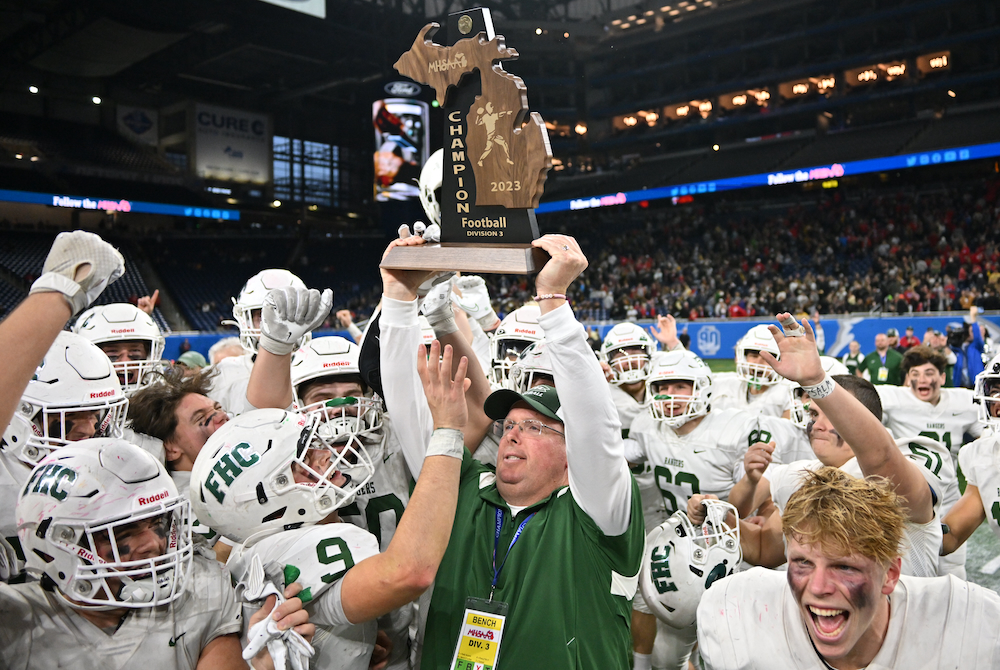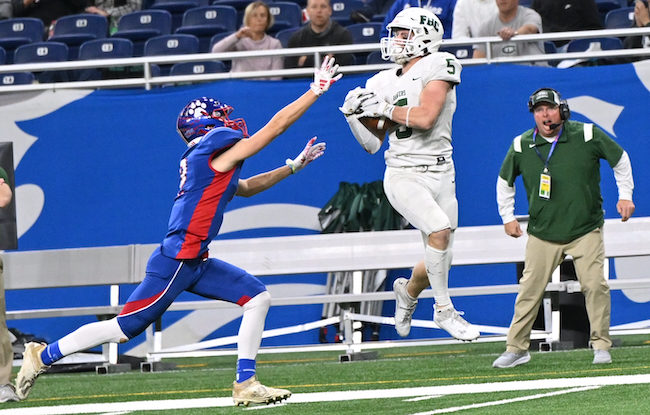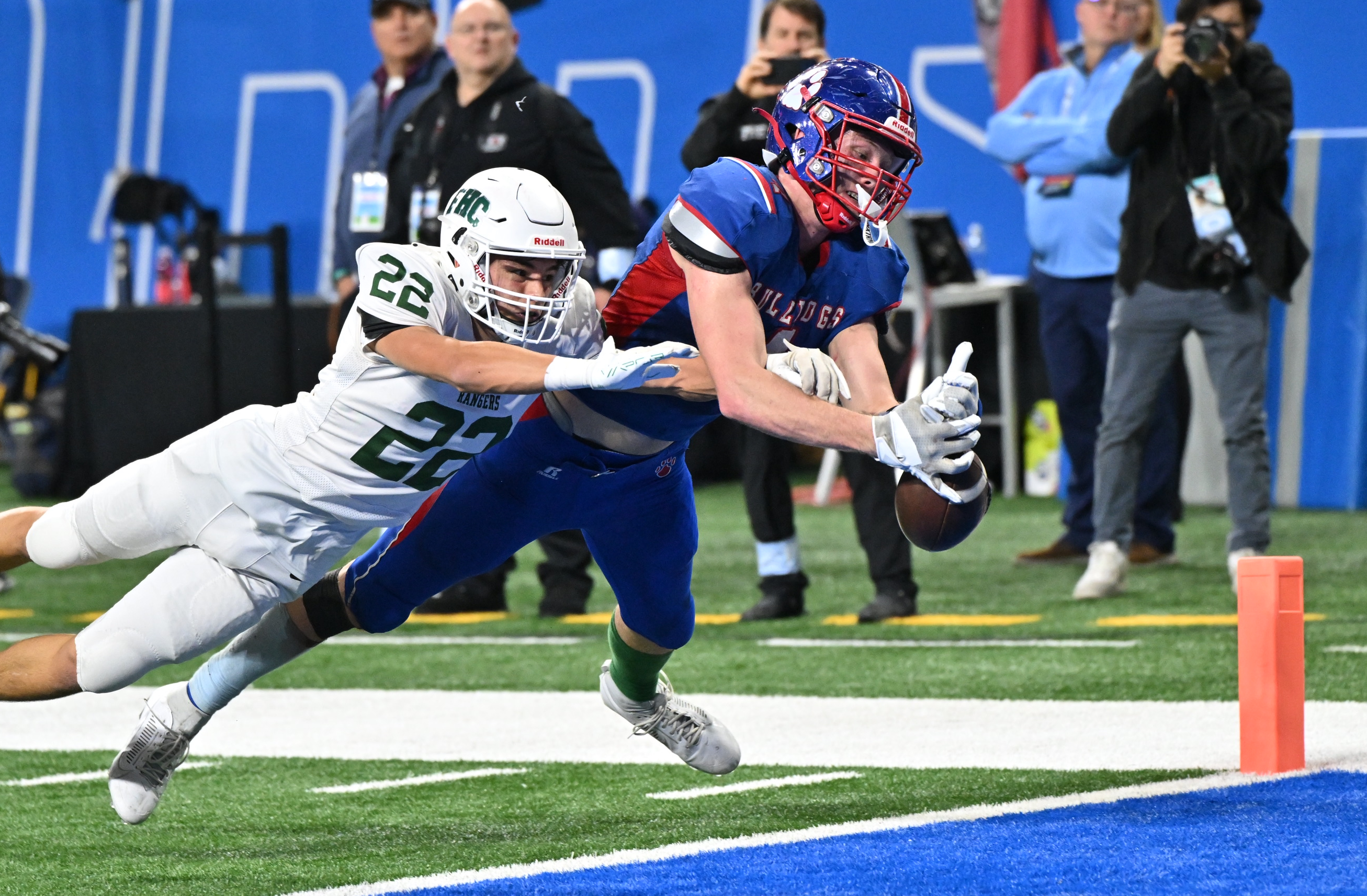
MHSA(Q&)A: NFL official Ronald J. Winter
July 19, 2012
By Brian Spencer
Second Half
 Kalamazoo's Ron Winter has officiated in the National Football League for nearly two decades, and became a referee in 1999. But long before he joined the highest level of the game, he got his start on Michigan's high school fields.
Kalamazoo's Ron Winter has officiated in the National Football League for nearly two decades, and became a referee in 1999. But long before he joined the highest level of the game, he got his start on Michigan's high school fields.
Winter has officiated that sport at all three levels and also high school and college basketball. He's also served as a source of knowledge for officials around the state -- and an example for those hoping to start at the high school level and climb to the pros.
Winter remains registered as an MHSAA official, as he's been for 42 years. An associate professor emeritus of human performance and health education at Western Michigan University, Winter was appointed earlier this month to serve a two-year term on the Governor's Council on Physical Fitness, Health and Sports. The council focuses on increasing physical activity and health improvements.
He served on the WMU faculty first beginning in 1969 and then again from 1992-2008. Winter earned bachelor and master's degrees at Michigan State University.
Did you play any sports in high school or college?
I played football, basketball, baseball, and track in high school. However, once I got to Michigan State University, I started playing lacrosse. A couple guys that lived near me played lacrosse and asked me to come out to throw the ball around. After throwing with them a couple times they asked me to come out for the team. I ended up playing lacrosse for MSU for four years.
How did you decide to choose football as the sport you would officiate?
I started officiating as a student at MSU in their intramural program, officiating touch football and basketball. The next logical step was to then officiate in the high school leagues. From there, I began to proceed to all the different levels.
Are there specific requirements for becoming an NFL official?
The biggest requirement is experience. The progression that I went through went like this:
After officiating high school games, I went to the MIAA (Michigan Intercollegiate Athletic Association). They (MIAA) were looking for people that had 3-5 years of experience at the high school level. From there I went to the Mid-Continent conference. I wasn’t able to go to the Mid-American Conference because I was employed at Western Michigan University.
From there I went to the Big Ten. The Big Ten was looking for people with 5 to 10 years of experience in high school and people that had experience at different positions as an official. I ended up officiating in as a Big Ten football official for 10 years and a Big Ten basketball official for 15 years. I then submitted an application to the National Football League. Coincidentally, the NFL was scouting officials, and had followed me for four years before they finally asked me to be a part of the staff. The NFL decides on who they want to pursue through recommendations and personal interest. They look for personality traits as well as how (officials) carry themselves through different situations.
What has been your favorite level to officiate; High school, college or professional?
I enjoyed officiating all of them, but for different reasons.
I found high school to be the most fascinating because it’s all about the kids; they are playing the game for the love of the game. That is the purest sense of the sport. I loved being involved with kids simply because they love the game.
I found the Big Ten to be most exciting because of the kind of atmosphere that exists on a Big Ten campus on a Saturday afternoon. It’s electric. You don’t get that same sense or the same feel on Sunday afternoon in a pro stadium.
I found the NFL to be most intense. The NFL really has three or four different levels of play during the season. There is preseason play, the first thirdof the season, the second third of the season, and the last five games of the season. Each level is ramped up another notch as the season progresses. Playoffs are entirely different all together. In terms of the intensity and pure speed of the game, there is nothing like the NFL playoffs.
How important is getting along with your fellow officials on the field?
It’s imperatively important if you want to have a smooth and well-run game. This doesn’t mean that you have to buddy-buddy off the field, but on the field you have to be committed to one goal. We spend two or three hours on meetings Saturday afternoon to go over rules tests, tape, and more to prepare for the next game (and) to get over rough patches that develop on a personal level in a previous week. I need to know that the other six guys are focused and thinking about football like me. Everyone has to have confidence in one another. We spend plenty of time on Saturday to get to the point that we need to on Sunday.
What has been the most exciting game you’ve officiated?
I’ve been in plenty of exciting games from NFL playoff games, to the first Orange Bowl game, to the Rose Bowl, to the Division III Hope vs. Calvin basketball game, to when Indiana played Purdue in basketball. All of them were incredible to be a part of. During the Indiana vs. Purdue game, the arena was electric. The players, coaches, fans were intense. Everybody is totally focused on the game. Each coach had a tremendous respect for one another. Neither one wanted to show up or embarrass their counterpart. This game wasn’t that drastically different at the Division III level, however. The intensity of both was very similar.
Are there games that you get excited to officiate more than others, presently?
Not in terms of specific teams. It really just depends on the circumstances, of course. Pittsburgh vs. Baltimore is an intense game. The Jets vs. Patriots game is great. There are clearly rivalries that are very exciting to be a part of. The level of play and intensity of the athletes in the NFL is unmatched and can provide excitement every week.
What is the most difficult aspect of being a NFL official?
I would say that preparation and being able to maintain intensity on the field on Sunday are key aspects. The preparation is difficult because it’s time-consuming. It is a misconception that we simply show up on Sunday to work the game. By the time Sunday rolls around, I’ve spent over 20 hours during the week trying to prepare for a Sunday game. It isn’t hard in terms of physical labor, but difficult in terms of a time commitment. You have to have an understanding family to be in the occupational field that I am in.
Do you have any advice for aspiring officials who hope to make it to the league?
Practice, practice, practice. Be able to work any game at any level and get as much experience as you can. Be a good partner on the field. It takes time; it isn’t something that just happens. Like anything else, it takes practicing your trade to be able to make it to the top level.

FHC Caps Ford Field Return by Sending Out Coach, Seniors with 1st Finals Win
By
Paul Costanzo
Special for MHSAA.com
November 26, 2023
DETROIT – Ty Hudkins and his Forest Hills Central teammates were not going to be denied Sunday in the Division 3 Football Final.
Not even if it meant – in Hudkins’ case – having to drag a Mason defender 20 yards for a touchdown.
Not after coming up one win short of bringing their program its first Finals title a year ago.
And certainly not in the final game of their coach Tim Rogers’ career.
So Hudkins dragged that defender, the Rangers got that last win, and they sent Rogers out a winner, defeating Mason 27-10 at Ford Field.
“We’ve been talking about this since sixth grade,” Hudkins said, before pointing to his teammates assembled at the press conference. “We’ve been playing for each other since we can remember. All our dads have been the coaches – coach’s kid, coach’s kid, coach’s kid, coach’s kid – it’s just been a real blessing. (Rogers) has been around with us the entire time, as well. It’s just a great way to end. We’ve been talking about it since sixth grade, and the fact that it finally came true is just crazy. It’s a blessing.”
Forest Hills Central had lost to Warren De La Salle Collegiate in the Division 2 Final a year ago. After that game, Rogers told the assembled media that the Rangers would be back, and he was proven correct.
This year, he made another major statement following the game, when he announced that he had just coached his final game at Forest Hills Central, calling it the “worst-kept secret in the state.”
 “It’s tough,” Rogers said before taking a moment to collect himself. “Their fathers are dear friends, my assistant coaches. There’s been plenty of inquiries if I was stepping down this year, and the last thing I wanted to be was a distraction to our team. So, do what we always do, put our head down and grind. I feel great. I watched these kids grow up. I think I’m leaving it better than I found it. These assistant coaches I have are fantastic – great fathers, great people, great husbands. So, it was great in our final game to do that. Send them off the way they deserve to be sent off. This community has waited a long time for something like this, and they’re fantastic. The student body was fantastic, our administration was very supportive. Storybook ending for my career to finish with these guys and do what we just did today.”
“It’s tough,” Rogers said before taking a moment to collect himself. “Their fathers are dear friends, my assistant coaches. There’s been plenty of inquiries if I was stepping down this year, and the last thing I wanted to be was a distraction to our team. So, do what we always do, put our head down and grind. I feel great. I watched these kids grow up. I think I’m leaving it better than I found it. These assistant coaches I have are fantastic – great fathers, great people, great husbands. So, it was great in our final game to do that. Send them off the way they deserve to be sent off. This community has waited a long time for something like this, and they’re fantastic. The student body was fantastic, our administration was very supportive. Storybook ending for my career to finish with these guys and do what we just did today.”
The Rangers (13-1) did it with defense, holding Mason to 36 yards rushing and 4.3 yards per play. They also forced three turnovers, including a pick-six from linebacker Drew Fortino with 7 minutes, 13 seconds to play, which made the score 27-10 and essentially put the game away.
“I saw the guy across the field, and I saw him coming across, and I kind of just stuck my hand out and was like, ‘Shoot, I got the ball,’” Fortino said. “The whole team blocked really well, and I was able to get into the end zone and they were all in there celebrating with me.”
Mason coach Gary Houghton called the Rangers’ front seven the fastest his team had seen this season, including that of Detroit Martin Luther King, who the Bulldogs played in the Semifinal. As the Bulldogs struggled to find room to run – both with and without star running back AJ Martell, who had eight carries for 14 yards before leaving the game with an injury – that became more and more apparent. But Rogers said it went beyond his team’s athleticism.
“They’re talented for sure,” Rogers said. “But they’re smart. They do so much. The offense gets so much credit for checks at the line of scrimmage and all the things they do. We do that all the time on defense. If you watch me and you knew our signals, half the time you’d just think I was calling base. But these guys check everything at the line of scrimmage. It’s a testament to their football IQ, how they get us in the right play all the time on defense, and just a relentless pursuit of the football.”
JT Hartman led the defense with an interception, a sack, two tackles for loss and eight total tackles. Brady Drueke had a team-high 12 tackles, Fortino added a sack and Hudkins had a diving interception.
The defensive performance was a far cry from a year ago, when the Rangers allowed 52 points in the loss to De La Salle.
“We knew we had to be better, just this offseason, so we worked extra hard in the weight room,” Hartman said. “I think all the extra work made us better players and better people. That translated out on the field.”
 While the Mason defense had a fine day itself, holding the Rangers to fewer than 300 yards of total offense and 5.5 yards per play, Central was able to break the game open in the second half thanks to a max-effort play from Hudkins. The Purdue commit hauled in a pass from quarterback Mason McDonald at the 28-yard line and was latched onto at the 20 by a Mason defender. Hudkins stayed on his feet, however, and powered his way into the end zone, diving for the pylon and giving his team a 20-3 lead.
While the Mason defense had a fine day itself, holding the Rangers to fewer than 300 yards of total offense and 5.5 yards per play, Central was able to break the game open in the second half thanks to a max-effort play from Hudkins. The Purdue commit hauled in a pass from quarterback Mason McDonald at the 28-yard line and was latched onto at the 20 by a Mason defender. Hudkins stayed on his feet, however, and powered his way into the end zone, diving for the pylon and giving his team a 20-3 lead.
“Just a touchdown in and of itself is a big deal, but to see the will – he was not going to be denied,” Rogers said. “With that, you could literally see the whole sideline just start to elevate. Ty was going to put us on his back literally and figuratively, and he wasn’t going to be denied.”
Hudkins finished the game with 115 yards on six receptions. McDonald led the Forest Hills rushing attack with 74 yards on 21 carries, while Hartman had 68 yards and a touchdown on the ground. Kicker Alex Moeller had a pair of field goals (35 and 27 yards).
For Mason (13-1), it was the end of its own storybook season, even if it didn’t come with the ultimate happy ending. The Bulldogs were playing in their first Final after knocking off King, the team that had ended their previous two seasons in Semifinals.
They had served as a rallying point for a community in mourning following the passing of classmates Lillian Klages and Amanda Blue, who died in an August car crash.
Mason players ran onto the field led by players carrying flags bearing their names.
“We gave it our best shot,” Mason senior receiver Kaleb Parrish said. “It wasn’t the outcome that we wanted, but we tried for the community. We knew this game was bigger than just a football game. At the end of the day, we all tried. When I looked up in the beginning, it was great to see all of the community that showed up. It was thousands – probably most of our community showed up.”
Parrish had a big day receiving in his final game at Mason, hauling in eight catches for 102 yards. Derek Badgley, who scored the Bulldogs’ lone touchdown on a 2-yard run late in the third quarter, added 71 yards on eight catches. Quarterback Cason Carswell was 22 of 40 passing for 229 yards. Kicker Collin Winters connected on a 26-yard field goal during the first quarter.
PHOTOS (Top) Forest Hills Central coach Tim Rogers holds up his program’s first championship trophy Sunday at Ford Field. (Middle) Ty Hudkins (5) hauls in a catch down the sideline for the Rangers. (Below) Jacob Harleton (22) breaks up a Mason pass at the goal line. (Photos by Hockey Weekly Action Photos.)

